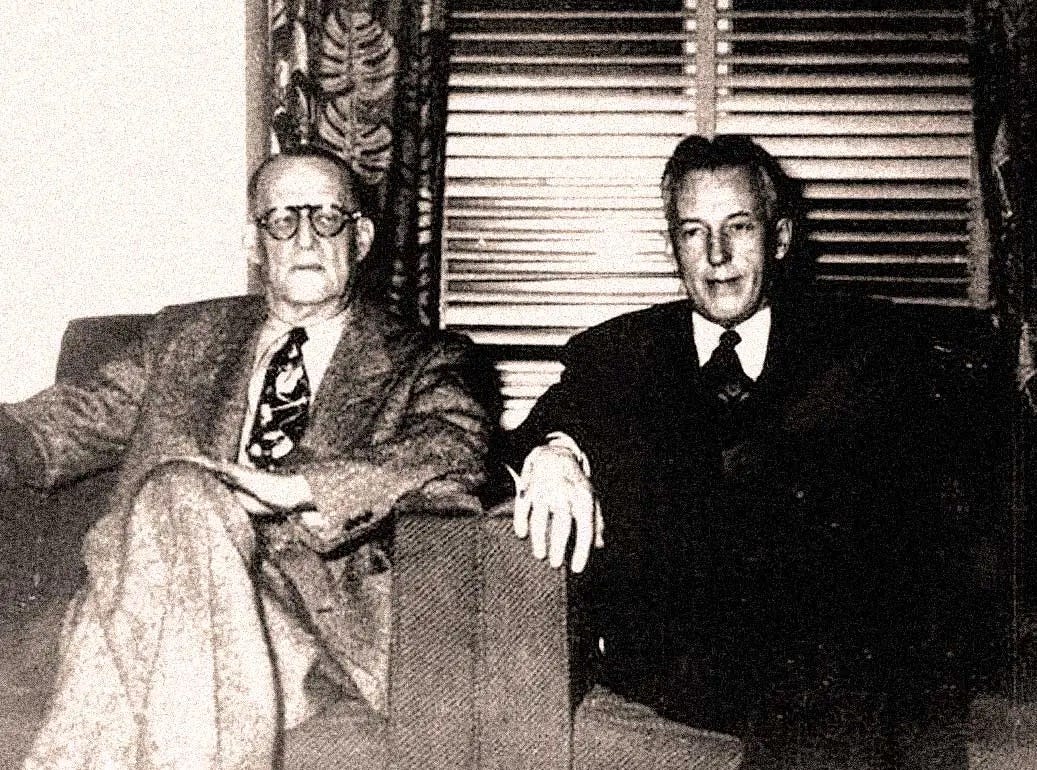Born in America in 1895, Bill Wilson had his first drink during the summer of 1916.
As an awkward and shy man, it put him at ease amongst people. “I had found the elixir of life", he recalled. But within a few years, his promising Wall Street career and personal life were in ruins.
Bill needed help, but few options were available to him at the time.
Early in the 20th century, the concept of addiction as a disease was not widely accepted. Alcoholics were considered morally weak and lacking willpower. This was the time of Prohibition in the United States (1920-1933), so people with drinking problems were often dealt with through the criminal justice system rather than offered medical or therapeutic help. It was about retribution, not rehabilitation.
But in 1934, Bill was amazed to hear that an old drinking buddy had achieved sobriety under the guidance of the Oxford Group, a Christian fellowship. So, Bill joined the group and sobered up and soon found that recruiting other alcoholics helped keep him straight.
Bill’s first success came in 1935 during a business trip to Akron, Ohio, where he was introduced to an American physician named Dr. Bob Smith, another hopeless drunk. Dr. Bob would drink during surgeries to steady his trembling hands and would go on drinking sprees, leaving his family clueless about his whereabouts for days. This became an open secret in his community, severely affecting his reputation and practice.
The meeting between Bill and Dr. Bob sparked regular interactions between the two men, providing them the much-needed support to maintain sobriety. They realised that speaking with another alcoholic provided a unique understanding and empathy, which was profoundly helpful.
Thus, they began to reach out to other alcoholics in Akron, forming a small group that met regularly. They applied principles from the Oxford Group but tailored them to the specific needs of alcoholics.
From these early meetings and their experiences, the foundational principles of Alcoholics Anonymous (AA) took shape. By 1939, the group had grown, and the foundational text of AA, The Big Book, was published. It laid out the famous Twelve Steps of the AA program. Because the steps reference a "Higher Power" or "God as we understood Him”, they have been adopted by people and cultures without Christian beliefs. Some see it as a force of the universe, nature, a personal deity from another religion, or even the group's collective wisdom.
AA is organised around an innovative decentralised structure based on its Twelve Traditions - guiding principles, ensuring the group's unity, focus, and independence. From humble origins in a small town in Ohio, today, there are more than 123,000 AA groups in more than 180 countries worldwide. AA membership is estimated at over two million people.
The topic of alcoholism has been on my mind a lot lately.
With the Rugby World Cup around the corner, I just read Rassie, the autobiography of the Springbok coach. He recounts his father’s struggle with alcoholism and how he came home from work each evening and kickstarted the night with a glass (not a shot, a glass) of Mainstay cane - straight, no ice, no mix. I’ve also been watching The Sopranos (side note: the best series ever made 🤯), where a main story arc covers the addiction problems of Christopher Moltisanti, a leading character.
In both cases, addiction wreaked havoc in these men’s lives.
Winston Churchill’s love of booze is well documented. “I have taken more out of alcohol than alcohol has taken out of me”, he famously said. My own alcohol consumption ebbs and flows. Whenever I feel I can’t truthfully say the same as Mr. Churchill, I know it’s time to cut back.
As the father of two small kids, I always have in the back of my mind the dangers they may face one day when they are older. Addiction is one of them. I’ve seen close friends struggle with addiction, and it’s horrible to witness. It’s dark. In his famous essay, “My Addicted Son”, David Sheff shared his experience as a father to a (drug) addicted son:
“Through Nick's drug addiction, I learned that parents can bear almost anything. Every time we reach a point where we feel as if we can't bear any more, we do.
Things had descended in a way that I never could have imagined, and I shocked myself with my ability to rationalize and tolerate things that were once unthinkable.
He's just experimenting. Going through a stage.
It's only marijuana.
He gets high only on weekends.
At least he's not using heroin.
He would never resort to needles.
At least he's alive.”
Since starting the AA, Bill and Dr. Bob stayed sober for the rest of their lives. Despite the insane success and influence of the AA, they made no money from it. They remained committed to the primary mission of AA, which was to help others. That, they most definitely did.
If you enjoyed today’s article, please SHARE it ✉️ with a friend. You’d be doing me a big favour.
Otherwise, please LIKE it ❤️.
Thanks for reading. Have a super weekend.
👇👇👇👇👇👇👇👇👇👇👇👇








